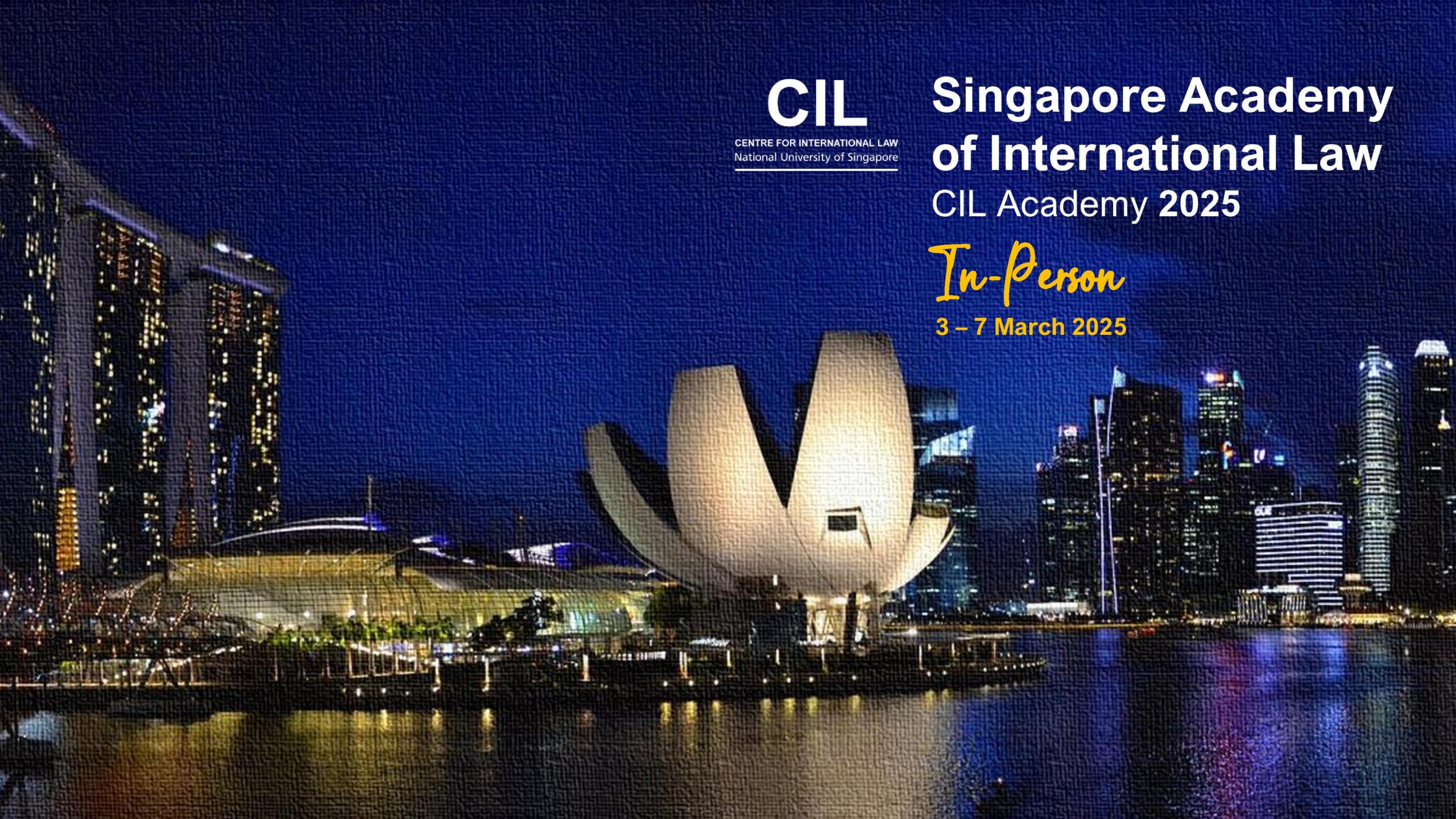Venue
Start
End

The CIL Singapore Academy of International Law (CIL Academy 2025) will be held for the first time in person from 3 - 7 March 2025. This training course will provide law students, young academics, diplomats, and lawyers the opportunity to develop their knowledge of the core topics and current challenges in international law.
The interactive thematic courses will be delivered by highly qualified academics and practitioners from Singapore and around the world. The lecturers include, among others, members of the United Nations International Law Commission, leading academics, and prominent practitioners in the different subjects offered. Materials will also be provided in advance to enhance the interactive nature of the courses.
Training certificates will be awarded by the NUS Centre for International Law upon successful completion of the Academy.
WHY YOU SHOULD PARTICIPATE
CIL Academy 2025 will be in-person training courses, and participants will have an opportunity to interact with the lecturers and Special Guests. The courses are highly interactive, encouraging active engagement. Participants will benefit from a dynamic learning environment to deepen their knowledge of international law.
Registration Fee | SGD 800nett | Register by 14 February 2025
Enquiries: cil.events@nus.edu.sg
TRAINING SESSION DURATION
Training courses: (3 hours x 2 courses per a day) | Monday – Friday
Special Lecture: Monday
Total hours of training = 30 hours
MODULES
DAY ONE | Monday, 3 March 2025, 10 am – 5 pm
International Law Making
- This module will look at how international law is made today from both an academic and a practitioner's point of view. It will present a dynamic and interactive view of the sources of international law, especially treaty and customary law, and discuss the growing role of soft law. It will also analyse specific issues related to treaty negotiations, at the bilateral and multilateral levels.
Peace and Security
- The module will evaluate the current challenges to international peace and security, focusing on the role of the United Nations Security Council, new threats such as terrorism and cyber-attacks, and the growing relevance of non-state armed groups. It will analyse important questions concerning the use of force and self-defence in the 21st century.
Special Lecture at 5:15 pm
DAY TWO | Tuesday, 4 March 2025, 10 am – 5 pm
Courts and Tribunals (Dispute Settlement)
- This module will look at recent developments related to dispute settlement and international courts and tribunals. It will examine the different possibilities for settling international disputes, such as negotiation, mediation, conciliation and judicial means. It will focus on the issues that have arisen in recent cases before international courts and tribunals concerning inter-State and investor-State disputes.
Diplomatic and Consular Law and Immunities
- This module discusses key challenges that arise today in relation to diplomatic law, such as the functions of the diplomatic mission, the protection of diplomatic premises, the role of the host State and the question of diplomatic immunities. It will also explore the broader issue of immunities under international law, including State immunities, and the immunities of State officials before foreign criminal jurisdictions and international courts and tribunals.
DAY THREE | Wednesday, 5 March 2025, 10 am – 5 pm
Human Rights
- The module will provide a overview of the international and regional mechanisms for the protection of human rights. It will discuss pressing issues such as the protection of human rights during armed conflicts, human rights violations—such as those stemming from domestic violence—in a pandemic, as well as the relationship between human rights and the environment.
International Humanitarian Law and Criminal Law
- The purpose of this module is to provide an overview of the main features of international humanitarian law and international criminal law. The module will also highlight and discuss the current challenges in this area related to new types of conflicts, actors, weapons and technologies, strengthening implementation and promoting accountability. Special attention will be paid to the roles of the International Committee of the Red Cross (ICRC), International Criminal Court, Ad Hoc Criminal Tribunals and mechanisms of transitional justice.
DAY FOUR | THURSDAY, 6 March 2025, 10 am – 5 pm
Sustainable Development
- The objective of this module is to briefly present the evolution of the concept of sustainable development, highlighting its main features and the key challenges concerning the 2030 Sustainable Development Agenda. In particular, it will discuss the relationship between sustainable development and international law, and the role of international law in promoting the Sustainable Development Goals.
Climate Change
- This module discusses the development of international law to tackle climate change. It will present the key features of the international climate change regime and highlight recent developments in international and domestic implementation frameworks, climate justice and climate litigation.
DAY FIVE | FRIDAY, 7 March 2025, 10 am – 5 pm
International Responsibility
- The objective of this module is to discuss current issues related to the international responsibility of States, International Organisations and other non-State actors. It will also focus on the issue of liability for acts not prohibited by international law and analyse examples of how the regime of international responsibility is applied in practice.
Cyber and Artificial Intelligence
- The advent of new technologies, particularly cyberspace, has sparked significant debate regarding their potential impact on the content and structure of international law. The disruptions brought about by Artificial Intelligence (AI) are expected to be even more profound. This module explores the interplay between AI, cyberspace, and international law, examining the influence of AI and cyberspace on various aspects of international law, such as state responsibility and the laws of armed conflict.
REGISTER HERE

